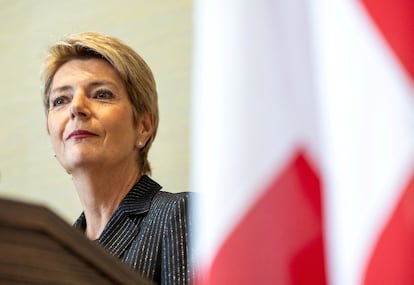Switzerland's best option against Trump is to export smoke

Text in which the author advocates ideas and draws conclusions based on his or her interpretation of facts and data

Switzerland is famous for its punctuality, neutrality, and precision engineering. None of these qualities are particularly useful to President Karin Keller-Sutter, who has traveled to the US in a last-ditch attempt to negotiate the 39% tariffs Donald Trump is planning to impose.
The reason for Trump's anger is Switzerland's large trade surplus in goods , reaching $44 billion in 2024. But two-thirds of that figure was in pharmaceutical products, which are not subject to the 39%. The US tax, which takes effect today, will, however, make imported Rolex watches and Lindt chocolates more expensive.
Keller-Sutter has a tried-and-tested formula for persuading Trump: making eye-catching promises to invest in the US or buy more products from it, as the EU and Japan have done. The problem is that Bern has already tried this strategy. In April, it proposed that its companies invest more than $150 billion in the US over four years, an annual increase more than double the actual increase between 2023 and 2024, according to data from the Bureau of Economic Analysis. Per capita, the Swiss promise was ten times higher than the EU's offer.
Trump's decision to move forward means Keller-Sutter will have to go further. It will be complicated. For example, Roche has already promised to invest $50 billion in the US. It is likely to be reluctant to commit to more, as Trump has not finalized a separate sectoral tariff on pharmaceutical imports, but has hinted that, at least initially, the rate will be relatively low.
Keller-Sutter's other options don't seem very attractive either. Swiss tariffs on US imports are already zero, and the country can't relax restrictions on agricultural imports without upsetting its powerful farmers. Buying more US defense equipment also carries a political burden, as the White House said earlier this year that it could increase the price of a shipment of F-35 jets by up to $1 billion.
The logical thing to do is to imitate Trump by exaggerating and dissembling. Both the EU and Japan have been vague about their promises. Keller-Sutter might have to invent a more striking figure, perhaps spread over more years and backed by reputable companies.
The authors are columnists for Reuters Breakingviews . The opinions are their own. The translation, by Carlos Gómez Abajo , is the responsibility of CincoDías.
EL PAÍS







